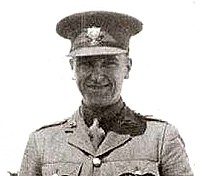|
Francis Cecil
Leonard
Bell
1912-2012 |
 |
The distinguished soldier Colonel
Bill Bell, who died in December 2012 at the age of 100, was the son of
Cecil Walker Bell (1868-1947), a well known Bourne solicitor who lived at
the family home in West Street that survives today as Bourne House.
He served with distinction in the Second World War of 1939-45 when he was
awarded an MC in Tunisia in 1943 and a DSO in Italy the following year, a
military career in which he became known as Colonel Bill Bell.
His father,
Cecil Bell, was a member of an old established family of lawyers which
practised in Bourne for 150 years and he also had a military background
himself, a part-time soldier who was proud of his army commission,
commanding H Company, the 2nd Volunteer Battalion, the Lincolnshire
Regiment, for 11 years and rising to the rank of major.
His son, Francis Cecil Leonard Bell, was born at Bourne on 25th September
1912 and educated at Gresham’s School where he excelled at sport,
especially hockey, which he later played for Lincolnshire. He also studied
law and qualified as a solicitor before moving to London in 1937 to join
the Board of Trade’s legal department, working there until the outbreak of
war.
Bell had been commissioned into the 4th Battalion Lincolnshire Regiment
(TA) in 1931 and transferred to 6 LR in 1939. He accompanied this unit to
France as part of the BEF and was evacuated from Dunkirk in a
flat-bottomed Chinese river gunboat. He was mentioned in despatches.
In July 1944, Bell took command of the 6th Battalion the Lincolnshire
Regiment (6 LR) in Italy. In September, during the break through at the
Gothic Line, he rallied two of his companies which had suffered many
casualties after coming under heavy enemy defensive fire.
In the winter months he led his battalion in periods of continuous action,
often in situations where the Germans attacked his positions in divisional
strength using tanks and infantry. The citation for the award of a DSO
concluded: “Colonel Bell has served in this battalion in all ranks from
platoon commander to commanding officer. His conduct and gallantry
throughout the war and his inspiring leadership in action have been
outstanding. By his personal leadership in the thick of battle he has
often turned difficult situations into major successes.”
In January 1943, he landed in Algiers and two months later, as a company
commander of 6 LR at Sedjenane, Tunisia, he was awarded an MC for
repelling a series of determined attacks and for frustrating an
outflanking movement. The citation also stated that, in the face of
relentless sniping, he had attempted to rescue a wounded officer who was
lying in the open. The officer died as Bell reached him.
Bell was put in temporary command of the battalion during the final
battles of the North African campaign when the C O was killed in action.
He commanded B Company during the landings at Salerno in September 1943
and in fierce fighting at Monte Cassino in the winter of 1943-44. He
accompanied 6 LR when it moved to Greece and then on its return to Italy
in the final month of the campaign.
After the war, Bell returned to the Board of Trade, remaining until 1953
when he was appointed assistant legal adviser to Lloyds Bank, eventually
becoming chief legal adviser. Remembered as a very able lawyer and for his
integrity, strength of character and fine judgment, he retired from the
bank in 1977 and for the next five years, served as a director of the
British Bankers’ Association (then known as the Committee of London
Clearing Banks), and chairman of its European Legal Committee. He was
appointed non-executive director of two of the bank’s subsidiaries after
his retirement.
He attended regimental reunions in Lincolnshire until he was in his late
eighties and served as trustee and president of the Battalion Benevolent
Fund. He was president of his local branch of the Royal British Legion for
many years. In 1967 he was appointed Honorary Colonel of the Royal
Lincolnshire Regiment (Territorial).
In retirement and settled at Chiddingfold, Surrey, Bell was able to
indulge his enthusiasm for fishing and shooting. A man of considerable
charm, he was excellent company and loved good food and wine. At his 100th
birthday party he enjoyed several glasses of vintage Pol Roger.
Bell died on 20th December 2012. He had married first in 1942 to Mary
Wynne Jacob who predeceased him and secondly in 1999 to Priscilla Muir who
survives him with a son and daughter of his first marriage.
Ironically, Bourne may have remained Colonel Bell's home town had not his
father moved to the south coast in 1940 following an acrimonious
disagreement a few years earlier when he was people's warden at the Abbey
Church. The dispute led to a prolonged libel hearing in which he was sued
for damages by the Vicar of Bourne, Canon John Grinter, and although the
jury found in the vicar's favour, he was awarded a mere £5 in damages in a
case which the judge described as "discreditable and squalid" and one
that should never have been brought before the court. Cecil Bell died at
Eastbourne in 1947, aged 78.
NOTE: Acknowledgments to the Daily
Telegraph, Sunday 20th January 2013
for obituary details of Colonel Bell.
See also Cecil Bell

Go to:
Main Index Villages
Index
|
